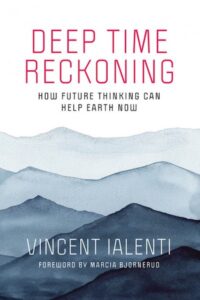 In those rare moments when I’m at liberty to simply sit and think about everything and nothing at all, one of the intellectual exercises in which I like to engage is in pondering the question of how our choices in life would be different if we had absolute awareness of all information pertinent to any given decision. Related to this is another question I more recently began to explore following my reading of Prof. Marcia Bjornerud‘s 2018 book Timefulness: How Thinking Like a Geologist Can Help Save the World – specifically, what choices would we make if we could conceive of our actions at a scale of time far beyond our own, and even our own society’s, respective lifespan? To this later question, Prof. Vincent Ialenti has recently added a very real-world example of what such long-tern thinking looks like in practice.
In those rare moments when I’m at liberty to simply sit and think about everything and nothing at all, one of the intellectual exercises in which I like to engage is in pondering the question of how our choices in life would be different if we had absolute awareness of all information pertinent to any given decision. Related to this is another question I more recently began to explore following my reading of Prof. Marcia Bjornerud‘s 2018 book Timefulness: How Thinking Like a Geologist Can Help Save the World – specifically, what choices would we make if we could conceive of our actions at a scale of time far beyond our own, and even our own society’s, respective lifespan? To this later question, Prof. Vincent Ialenti has recently added a very real-world example of what such long-tern thinking looks like in practice.
In his new book Deep Time Reckoning; How Future Thinking Can Help Earth Now from MIT Press, Prof. Ialenti examines the challenges involved in thinking at a timescale far beyond that of our own, and perhaps even our own species’ frame of existence. As a case study, he presents the Safety Case project from Finland’s nuclear waste repository program and examines how its “scientists forecast far future glaciations, climate changes, earthquakes, and more, over the coming tens of thousands—or even hundreds of thousands or millions—of years.”
Introduced, (to me, serendipitously) by none other than the aforementioned Prof. Bjornerud, and part of the MIT Press” One World series – in which is also included Prof. Peter Dauvergne AI in the Wild; Sustainability in the Age of Artificial Intelligence previously noted in this column – Prof. Ialenti’s new Deep Time Reckoning presents us with the challenge that as thinking in a much longer time scale than that we commonly use is indeed, as the Finns have shown, possible, do we have what it takes to implement it into more aspects of our societal decisions? It is a question most certainly worth our time to consider, and reading his book is a very useful place to begin.
If you enjoyed reading this, please consider signing up for The Well-read Naturalist's newsletter. You'll receive a helpful list of recently published reviews, short essays, and notes about books in your e-mail inbox once each fortnight.
